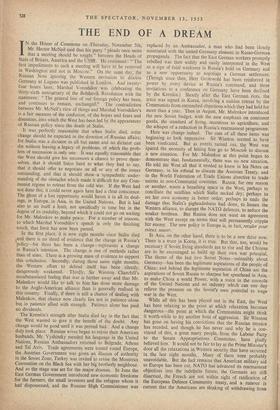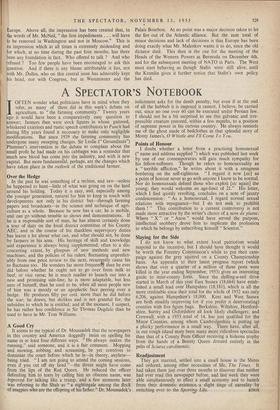THE END OF ,A DREAM
IN the House of Commons on Thursday, November 5th, Mr. Hector McNeil said that his party "pleads once more , that a meeting should be sought" between the Heads of State of Britain, America and the USSR. He continued: "The first impediments to such a meeting will have to be removed in Washington and not in Moscow." On the same day, the Russian Note ignoring the Western invitation to discuss Germany at Lugano was published in London. And twenty- four hours later, Marshal Voroshilov was celebrating the thirty-sixth annivorsary of the Bolshevik Revolution with the statement: "The general line of our foreign policy has been, and continues to remain, unchanged." The contradiction between Mr. McNeil's view of things and Marshal Voroshilov's is a fair measure of the Confusion, of the hopes and fears and disunities, into which the West has been led by the appearances of Russian policy since the death of Stalin.
It was perfectly reasonable that when Stalin died, some change should be expected in the direction of Russian affairs; for Stalin was a dictator in all but name and no dictator can die without leaving a legacy of problems, of which the prob- lem of succession is only one. It was equally reasonable that the West should give his successors a chance to prove them- selves, that it should listen hard to what they had to say, that it should offer to negotiate on all or any of the issues outstanding, and that it should show a sympathetic under- standing of the obstacles which made it difficult for any Com- munist regime to retreat from the cold war. If the West had not done this, it could never again have had a clear conscience. The ghost of a lost opportunity would haunt it in all its deal- ings, in Europe, in Asia, in the United Nations. But it had also to set itself a limit, not specifically in time but in the degree of its credulity, beyond which it could not go on waiting for Mr. Malenkov to make peace. For a number of reasons, to which Marshal Voroshilov's speech is only the finishing touch, that limit has now been passed.
In the first place, it is now eight months since Stalin died and there is no shred of evidence that the change in Russia's 'and there has been a change—represents a change in Russia's intention. The change is one of methods rather than of aims. There is a growing mass of evidence to support this cOnclusion. Secondly, during those same eight months, the Western effort to defend itself has been silently, dangerously weakened. Thirdly, Sir Winston Churchill's unsubstantiated feeling that war is further away and that Mr. Malenkov would like to talk to him has done more damage to the Anglo-American alliance than is generally realised in this country. Finally, if there is still a chance of dealing with Malenkov, that chance now clearly lies not in patience -alone but in patience allied with strength. Patience alone has paid no dividends.
The Kremlin's strength after Stalin died lay in the fact that the West wanted to give it the benefit of the doubt. Any change would be good until it was proved bad. And a change duly took place. Russian wives began to rejoin their American husbands, Mr. Vyshinsky mended his language in the United Nations, Russian Ambassadors returned to Belgrade, Athens and Tel Aviv. Trade agreements were touted round Europe, the Austrian Government was given an illusion of authority in the Soviet Zone, Turkey was invited' to revise the Montreux Convention on the Black Sea with her big brotherly neighbour. And so the stage was set for the major dramas. In June the East German Government introduced new economic freedoms for the farmers, the small investors and the refugees whom it had dispossessed, and the Russian High Commissioner was 'replaced by an Ambassador, a man who had been closely associated with the united-Germany element in Russo-German propaganda. The fact that the East German workers promptly rebelled was then widely and easily interpreted in the West as a sign of fatal weakness in Russia's hold on Germany and as a new opportunity to negotiate a German settlement. (Though since then, Herr Grotewohl has been reinforced in power by every device at Russia's command, and three invitations to a conference on Germany have been declined by the Kremlin.) Shortly after the East German riots, the truce was signed in Korea, involving a sudden retreat by the Communists from entrenched objections which they had held for more than a year. Then in August, Mr. Malenkov introduced the new Soviet budget, with the new emphasis on consumer goods, the standard of living, incentives to agriculture, and the whisper of a reduction in Russia's rearmament programme.
Here was change indeed. The sum of all these items was beginning to look impressive. Sir Winston seemed to have been vindicated. But as events turned out, the West was Spared the necessity of letting him go to MoscoW to discuss a new situation. For Mr. Malenkov at this point began to demonstrate that, fundamentally, there was no new situation. He told the West all that it needed to know in his Notes on Germany, in his refusal to discuss the Austrian Treaty, and in the World Federation of Trade Unions directive to trade unions in non-Communist countries. Russia, for one reason or another, wants a breathing space in the West, perhaps to conciliate the satellites which Stalin sucked dry; perhaps to set her own economy in better order; perhaps to undo the damage that Stalin's pigheadedness had done, to loosen the Western alliance, to disrupt the NATO defences, to seduce the weaker brethren. But Russia does not want an agreement with the West except on terms that will permanently cripple her enemy. The new policy in Europe is, in fact, reculer pour mieux sumer.
In Asia, on the other hand, there is to be a new drive now. There is a truce in Korea, it is true. But that, too, would be necessary if Soviet living standards are to rise and the Chinese are to be encouraged to build up their own war poten.tial. The theme of the last two Soviet Notes—ostensibly about Germany—has been the legitimate aspirations of the people of China; and behind the legitimate aspiration of China are the aspirations of Soviet Russia to sharpen her spearhead in Asia, to make China a world Power, with a voice in the councils of the United Nations and an industry which can one day relieve the pressure on the Soviet's own potential to wage war in the West.
While all this has been played out in the East, the West has been relaxing to the point at which relaxation becomes dangerous—the point at which the Communists might think it worth-while to try another bout of aggression. Sir Winston has gone on having his convictions that the Russian menace has receded, and though he has never said why he is con- vinced of this, a great many people, from the Labour Party to the Senate Appropriations Committee, have gladly believed him. It would not be fair to lay at the Prime Minister's door all the relaxations in Western security that have occurred in the last eight months. Many of them were probably unavoidable. But the fact remains that American military aid to Europe has been cut, NATO has advanced its rearmament objectives into the indefinite future, the Germans are still disarmed, the French are not within sight of ratification of the European Defence Community treaty, and a rumour is current that the Americans are thinking of withdrawing from Europe. Above all, the impression has been created that, in the words of Mr. McNeil, "the first impediments . . . will have to be removed in Washington and not in Moscow." This is an impression which at all times is extremely misleading and for which, at no time during the past four months, has there been any foundation in fact. Who offered to talk ? And who refused ? Too few people have been encouraged to ask this question. And if there is any blame attributable it lies, not with Mr. bulks, who on this central issue has admirably kept his head, nor with Congress, but in Westminster and the Palais Bourbon. At no point was a major decision taken to let the fire out of the Atlantic alliance. But the sum total of minor decisions and lack of decisions is that Europe has been doing exactly what Mr. Malenkov wants it to do, since the old dictator died. This then is the cue for the meeting of the Heads of the Western Powers at Bermuda on December 4th, and for the subsequent meeting of NATO in Paris. The West must start behaving as though Stalin were still alive, until the Kremlin gives it further notice that Stalin's own policy has died.

































 Previous page
Previous page